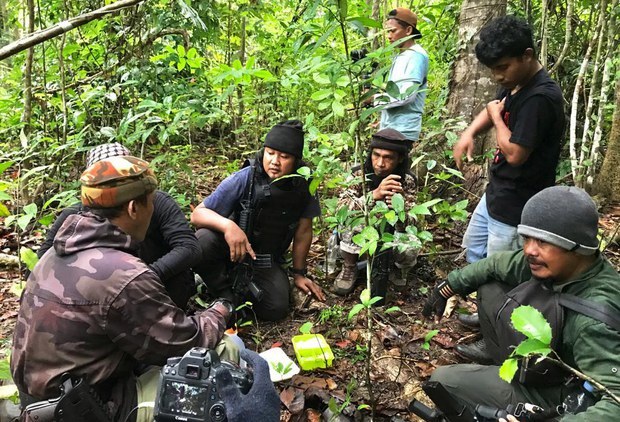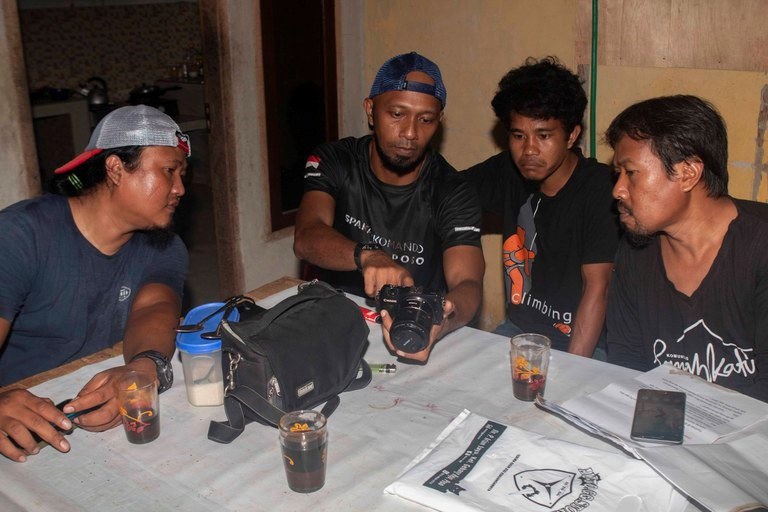Terrorist turned filmmaker wants to draw youths away from extremist groups
2022.07.25
Poso, Indonesia
 Amateur actors who play the role of Eastern Indonesia Mujahideen militants receive a briefing before the shooting of the film “Kurir” in the forest of Poso, in Central Sulawesi, Indonesia, June 2, 2022.
Amateur actors who play the role of Eastern Indonesia Mujahideen militants receive a briefing before the shooting of the film “Kurir” in the forest of Poso, in Central Sulawesi, Indonesia, June 2, 2022.
An ex-terrorist turned filmmaker is telling the true story of a cocoa farmer who was forced to become a courier for an Islamic militant group in Indonesia’s Sulawesi region so he could keep working his fields without fear of attack.
The 20-minute, self-funded film features amateur actors and is set for a limited, local release next month. It’s part of a series of films by former Jemaah Islamiyah (JI) member Arifudin Lako that aim to counter the spread of radicalism in Poso, a regency in Central Sulawesi province, where a bloody sectarian conflict once took place.
“This film is based on a true story that has never been told before in Poso,” Arifudin, 43, told BenarNews.
“Through this film, I’d like to warn the people of Poso and Indonesians in general not to be easily lured by groups that can lead them to radicalism, especially in the name of religion,” said the terrorism convict.
Indonesian authorities blamed JI, the al-Qaeda-linked militant group to which he belonged, for the 2002 Bali bombings that killed 202 people – Indonesian’s deadliest terror attack to date.
“Kurir [Courier]” follows cocoa farmer Iwan Gombo, who reluctantly becomes a courier for the Eastern Indonesia Mujahideen militant group whose members are hiding out in the jungles of Poso to evade capture by government security forces.
In real life, the Eastern Indonesia Mujahideen, or MIT, is one of two pro-Islamic State groups operating in Indonesia, the world’s most populous Muslim-majority country. The other is Jamaah Ansharut Daulah (JAD), which Indonesian authorities have blamed for most terror attacks in the archipelago nation during the past six years.
The MIT insurgency is concentrated in Indonesia’s Sulawesi region and is rooted in a Muslim-Christian conflict, which left more than 1,000 people dead between 1998 and 2001.
The number of MIT operatives has dwindled to two, but in May police arrested some two dozen militant suspects, many of whom said they were planning to join MIT.
Authorities said MIT members were responsible for several killings, including of civilians and police, in Poso and its surroundings since 2012. In May 2021, MIT killed four farmers in Central Sulawesi, and six months earlier, they killed four villagers living in a Christian community in Sigi regency near Poso.
Iwan, the farmer character in “Kurir,” is tasked with delivering supplies, including food and other necessities, and informing the militants on the movements of security forces.
“Kurir” director Arifudin said some couriers recruited by MIT, including Iwan and even some Hindus and Christians, were not supporters of MIT.
“Locals who work as farmers and planters were forced to become MIT couriers. This is a fact that we have established on the ground,” he said.
“Some of the farmers who were killed in Poso and Parigi Moutong used to work as MIT couriers. Because they resisted, they were gruesomely killed by MIT,” he said.
Supriyadi (also known as Upik Pagar and Perdiansyah), one of MIT’s founders who spent three years in prison, is part of the cast.
The film depicts real events, he said.
“This is what happened in Poso and not many people know that there are couriers who help MIT and they did not do so because of their ideology, but because they were forced due to fear of being killed,” he told BenarNews.
Supriyadi said he agreed to join the project at Arifudin’s request because of his mission to draw youth away from terrorism.
“I don’t want Poso people or anyone else in Indonesia to be involved in terrorism. Because what the militant groups have done is wrong in the eyes of the law and religion,” Supriyadi said.

‘No one … should become part of terror groups’
Arifudin, the film’s director, spent six years and four months in prison for taking part in the killing of a prosecutor in the provincial capital Palu in 2004. He has made several films to steer young people away from extremism.
He has made these films with the Rumah Katu Community, an NGO that seeks to empower youth from different religious backgrounds, and the Celebes Institute. His previous films are Home-made “Weapons,” “2/3 Nights,” “The Way Home” and “Salim’s Greetings.”
“All the films we made are interrelated. Everything is about terrorism with one goal: No one else, especially Poso children, should become part of terror groups,” Arifudin said.
In his supporting role in the film, Supriyadi plays the role of an MIT leader.
The main character, Iwan, is played by Ali Gombo, a student at Sintuwu Maroso University in Poso.
“Kurir” producer and casting director Adriani Badrah said teachers, students, civil servants and business people participated in making the film.
“Why do we make such films? Because radical groups are also spreading their ideas through films,” she said.
Adriani said the filmmakers did not receive outside funding.
“Our main goal is to convey a message. We don’t think about making money. Thank god, everything is going well,” she said.
The film’s videographer, Ferdiansyah Umar, said the crew made do with equipment they had while borrowing cameras and drones from their relatives.
“Although we use minimal equipment, we try to come up with the best results. And most importantly, because this is a short film, hopefully the message in this film can be immediately accepted by the public,” Ferdiansyah told BenarNews.
Lukman S. Thahir, a terrorism analyst in Palu, said the fact that former militants are engaging in positive activities is a testament to the success of their deradicalization.
“Their positive movement must be supported,” Lukman told BenarNews.
“The campaign against radicalism through the film is a real step that addresses religious, social and cultural aspects,” he said.
The film will be screen in all schools and universities in Poso, said Yasin Mangun, the area’s deputy regent.
“We will facilitate [the screenings], so that the message of the film can reach the community, especially young people who are in schools and universities,” Yasin said.
He also said that his administration was paying attention to the welfare of repentant former terrorism convicts.
“For ex-convicts, we focus on improving their welfare, by among others, creating jobs and providing assistance,” he said.







